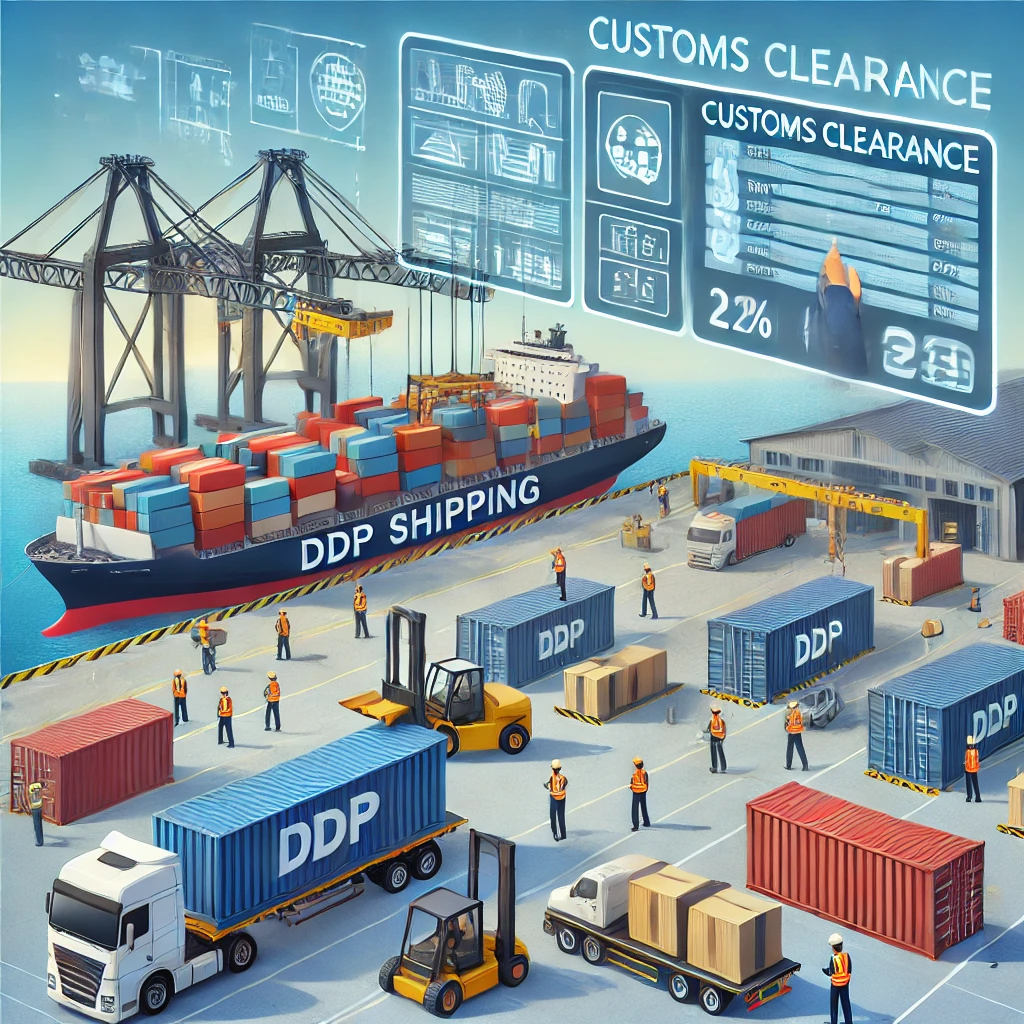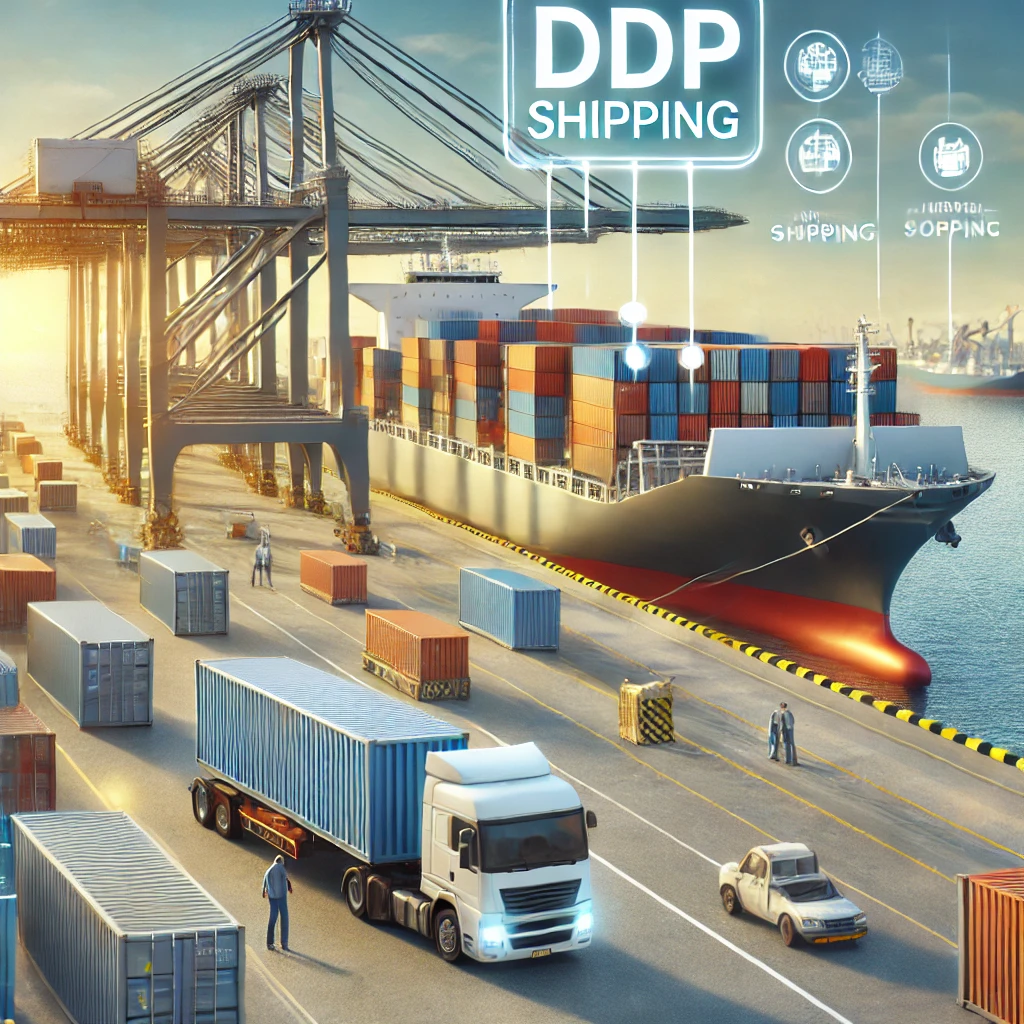The Basics of DDP Shipping

What is DDP Shipping?
DDP (Delivered Duty Paid) is one of the Incoterms (International Commercial Terms) defined by the International Chamber of Commerce (ICC). It outlines that the seller is responsible for all costs and risks involved in delivering goods to the buyer’s location, including transport, insurance, customs duties, and taxes.
In a DDP Shipping arrangement, the seller assumes full responsibility for delivering the goods to the buyer’s specified destination. This includes managing customs clearance and handling all import duties and taxes at the destination.
Key Features of DDP Shipping

- Seller’s Responsibilities:
- The seller handles all the logistics, including transportation, customs clearance, and delivery to the buyer’s location.
- The seller is also responsible for paying the import duties, taxes, and fees at the destination.
- They must ensure that the goods are delivered on time, in the correct quantity, and in good condition.
- Buyer’s Responsibilities:
- The buyer is only responsible for receiving the goods at the destination.
- Under DDP, the buyer has minimal involvement in the logistics process, as the seller takes on most of the responsibility.
- Customs Clearance:
- The seller is in charge of customs clearance at both the export and import countries.
- The seller is responsible for any customs documentation, filing, and paying of import duties or taxes.
- Delivery to Buyer’s Doorstep:
- DDP shipping means the seller delivers the goods to the buyer’s specified address, typically the buyer’s warehouse, office, or any other place of business.
- The seller is responsible for delivering the goods to the agreed-upon destination without any additional costs to the buyer.
How DDP Shipping Works
Here’s a breakdown of the process involved in DDP Shipping:
- Order Confirmation: The buyer places an order with the seller, and they agree on DDP terms. The seller will be responsible for the entire logistics process, including transportation and customs clearance.
- Shipping and Transportation: The seller arranges for the goods to be shipped from their location to the buyer’s location. The seller manages all aspects of transportation, including shipping by sea, air, road, or rail.
- Customs Clearance: The seller ensures that the goods clear both export and import customs at the respective countries. They will handle all customs documentation and fees associated with importing the goods to the buyer’s country.
- Payment of Duties and Taxes: The seller covers all duties, taxes, and import charges that are applicable in the buyer’s country. This ensures that the buyer does not need to worry about paying additional fees upon arrival of the goods.
- Final Delivery: Once the goods arrive in the buyer’s country, the seller arranges for the final delivery to the buyer’s specified location. The seller is responsible for unloading the goods and delivering them safely to the buyer’s address.

Practical Uses of DDP Shipping
- Simplified Shipping for Buyers:
- For the buyer, DDP shipping means fewer concerns regarding customs clearance, taxes, or logistics. They can receive the goods without any extra administrative burden.
- The buyer only needs to confirm the delivery address and ensure that the seller handles all other arrangements.
- Reduced Risks for Buyers:
- The seller assumes the risk of the shipment during transit, including customs-related issues. This gives the buyer peace of mind, as they do not have to worry about unexpected costs or delays.
- Attractive for International Trade:
- DDP is particularly attractive for international transactions, as it eliminates complications with cross-border shipping, customs clearance, and taxes.
- Sellers who offer DDP are perceived as providing a more customer-friendly service, as they take on the responsibility for ensuring smooth and timely delivery.
- Seller’s Competitive Advantage:
- Sellers who provide DDP shipping have a competitive advantage because they take the burden off the buyer. This can make the seller’s offering more attractive to potential international clients.
- It also ensures that the seller retains control over the shipping process, which can lead to a smoother transaction and better customer experience.
Benefits of DDP Shipping
- Efficiency and Convenience:
- DDP allows for a streamlined and convenient process for both the seller and the buyer. The buyer doesn’t need to deal with logistics or customs, which saves time and reduces the chances of errors in shipping.
- The seller manages the entire process, ensuring the goods are delivered promptly and correctly.
- Predictable Costs:
- Since the seller is responsible for all the shipping and import-related costs, the buyer can anticipate the total cost of the purchase upfront, avoiding surprises.
- This creates a clear and predictable pricing model, which is essential for businesses to plan and budget accordingly.
- Improved Customer Satisfaction:
- With DDP shipping, the seller takes on the risk and responsibility, which can lead to greater customer satisfaction. Buyers appreciate not having to handle logistics and administrative work.
- It can enhance long-term relationships between the buyer and seller, as the buyer feels that the seller is providing a comprehensive service.
- Minimized Delays:
- DDP shipping minimizes delays at the border since the seller ensures that all customs duties and taxes are settled before delivery. The buyer doesn’t have to worry about customs clearance or potential delays at the destination port.

When to Use DDP Shipping
- For International Business Transactions:
- DDP shipping is ideal for international business transactions, particularly when the seller wants to provide an all-inclusive service.
- It is often used when the buyer is unfamiliar with the import process or doesn’t have the resources to manage customs clearance and taxes.
- For Buyers in Emerging Markets:
- Buyers in countries with complicated customs processes or high taxes may prefer DDP, as it helps them avoid navigating complex import regulations.
- For Time-Sensitive Shipments:
- DDP shipping is ideal for time-sensitive shipments, as the seller is responsible for ensuring prompt delivery, including managing the customs process efficiently.
Conclusion
DDP shipping is a practical and efficient option for international trade, simplifying the logistics process for buyers and providing sellers with an edge in competitive markets. By taking on the responsibility for all costs and logistics, sellers can ensure smooth and hassle-free delivery for their customers. For businesses looking to expand internationally, DDP shipping is a great way to offer a comprehensive and customer-friendly service.
